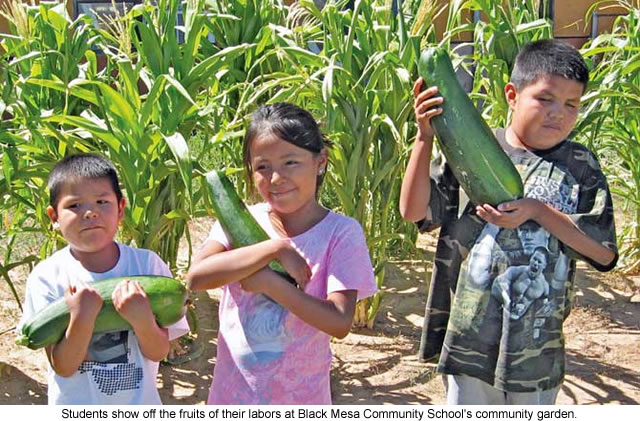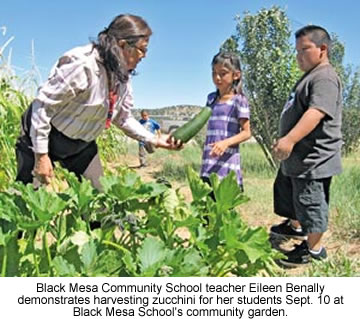 |
Canku Ota
|
 |
|
(Many Paths)
|
||
|
An Online Newsletter
Celebrating Native America
|
||
|
October 1, 2010 - Volume
8 Number 10
|
||
|
|
||
|
Students Grow, Eat
Their Own Veggies At Black Mesa
|
||
|
by Cindy Yurth - Navajo
Times Tséyi' Bureau
|
||
|
credits: photos by Cindy
Yurth - Navajo Times Tséyi' Bureau
|
|
BLACK
MESA, Ariz. - In the continuing battle to get children to eat their
vegetables, Black Mesa Community School may have stumbled upon a
secret weapon.
Apparently, vegetables taste better when eaten by the kids who grew them. "Yeah!" confirmed Laneisha Clah, 8. In front of this tiny school (53 students at last count), remote even by Navajo standards, is an overflowing garden plot complete with corn, beans, squash, melons and several young fruit trees. Children dash about the crops looking for harvest-ready veggies as though they had been turned loose with a dollar bill in a candy store.
But they're careful not to step on the plants. After all, they grew each one, volunteering during the summer. Baby veggies may be all the rage in gourmet magazines, but here on the Navajo Nation, size counts. "My zucchini's bigger than yours!" boasts one boy. "No, mine is!" argues a girl. Science teacher Iris Rockbridge, the earth mother behind this enterprise, sees an opportunity for a math lesson. "Let's measure them!" she suggests. The garden has also been used to teach science (Does corn grow better indoors or out?) and even art (note the brightly painted birdhouses hanging from the fruit trees). But there is another lesson Rockbridge considers at least as important: Good nutrition is a lifelong habit that can never be developed too early. It's sunk in to all the kids. "We grow vegetables so we can eat healthy and we can stay better and we won't get sick," Clah explained matter-of-factly.
"Part of gardening is learning about sharing," Rockbridge said. This is Black Mesa's second attempt at a community garden. Last year, the crops were doing great when someone left the gate open and a herd of errant cattle demolished all hopes of a harvest. "This year, the kids are keeping a much better eye on it," Rockbridge said. Another lesson taught by the garden: Protect what you have worked hard for. The garden was actually the brainchild of the children themselves. "I asked them what they wanted to study for science and they said, 'Gardening,'" Rockbridge recalled. Not having much of a green thumb, she signed up for the master gardener course at the Chinle Comprehensive Health Facility. Instructor Majel Brown immediately volunteered to offer some classes at the school, and when Wanda Clark at Chinle's New Dawn office heard about it, she pitched in some seeds and fruit tree saplings. "It seemed like once we got started, everyone wanted to help us," Rockbridge said. Black Mesa is not the ideal place to farm. The soil is poor, rainfall is minimal and, at over 6,000 feet, the zucchini leaves are already showing the black tinge of frostbite. Still, the kids have managed an ample harvest, and their efforts are being noticed. "It's starting to spread to the community," said teacher Daisy Kiyaani. "I've seen a lot more little backyard gardens this year." Meanwhile, Principal Marie Rose, a firm believer in healthy eating, is ramping up the nutrition message. The children's 3 p.m. snack break is likely to be strawberries and bananas instead of cookies and crackers, and teachers are discouraged from bringing soda pop to school. "What we're hoping is that even if children don't have good nutrition in the home, we can role-model for them at school," Rockbridge explained. It seems to be working. With nobody to tell them they're supposed to hate veggies, the kids are talking about them as though they were comparing ice cream flavors. "We should grow carrots next year," suggests one girl. "Carrots are my favorite." "Mmmm! And peppers!" chimes in another. "I guess we have to make the garden bigger next year," says Rockbridge with a smile. |
|
|
||
|
|
||
| Canku Ota is a free Newsletter celebrating Native America, its traditions and accomplishments . We do not provide subscriber or visitor names to anyone. Some articles presented in Canku Ota may contain copyright material. We have received appropriate permissions for republishing any articles. Material appearing here is distributed without profit or monetary gain to those who have expressed an interest. This is in accordance with Title 17 U.S.C. Section 107. | ||
|
Canku Ota is a copyright ©
2000, 2001, 2002, 2003, 2004, 2005, 2006, 2007, 2008, 2009, 2010
of Vicki Barry and Paul Barry.
|
||
 |
 |
|
|
The "Canku
Ota - A Newsletter Celebrating Native America" web site and
its design is the
|
||
|
Copyright ©
1999, 2000, 2001, 2002, 2003, 2004, 2005,
2006, 2007, 2008, 2009, 2010
of Paul C. Barry.
|
||
|
All Rights Reserved.
|
||

 The
veggies make their way into the school lunch and any overflow is
personally delivered to needy members of the community by the children
themselves.
The
veggies make their way into the school lunch and any overflow is
personally delivered to needy members of the community by the children
themselves.